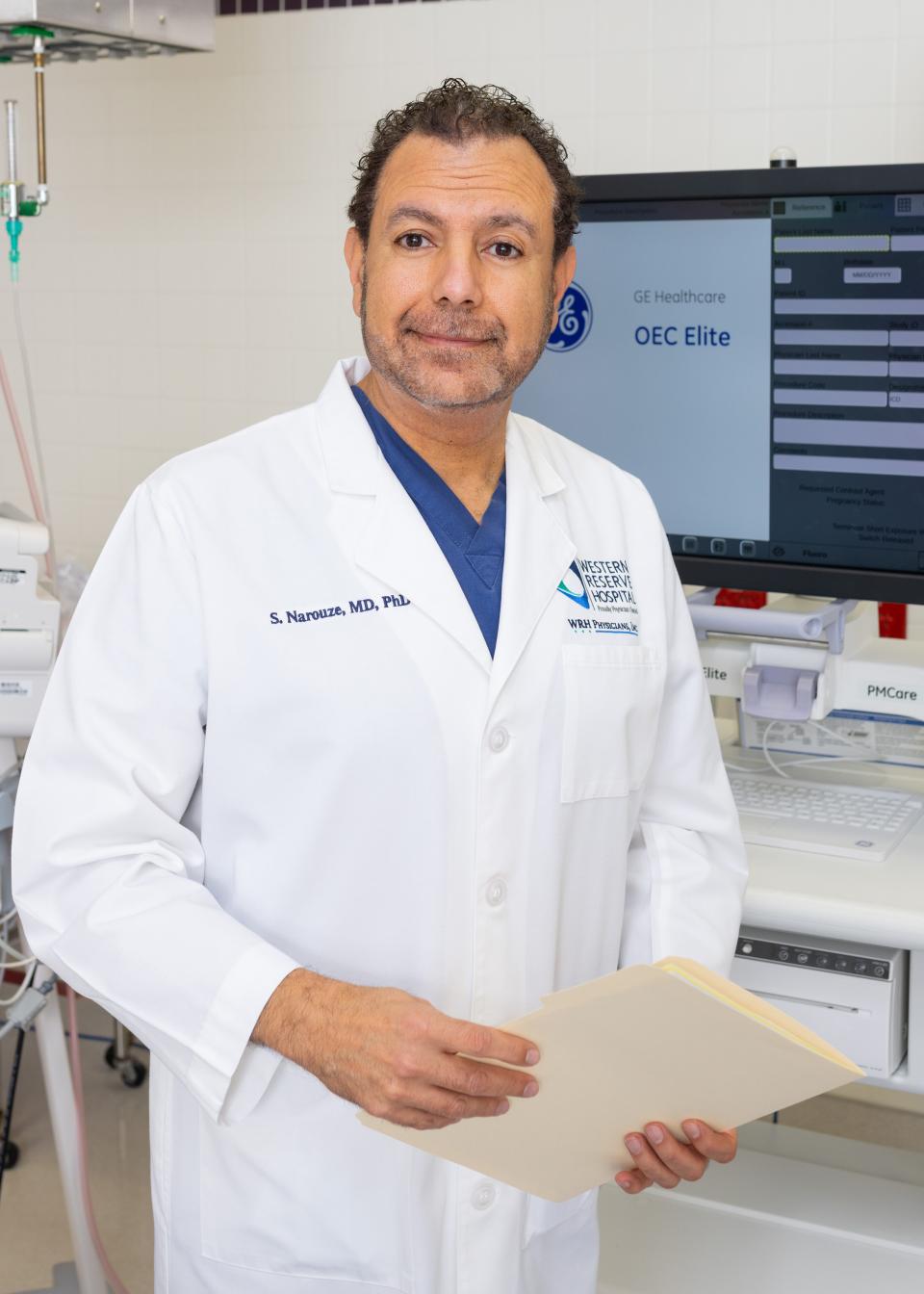New guidelines suggest heavy marijuana use be disclosed before surgery
- Oops!Something went wrong.Please try again later.
New guidelines released by a national industry board suggesting anesthesiologists ask patients about their cannabis and marijuana use before surgery have a local connection.
The new guidelines were released this month by the American Society of Regional Anesthesia and Pain Medicine. Dr. Samer Narouze, chair for the Center for Pain Medicine at Western Reserve Hospital in Cuyahoga Falls, is president of that organization.
The guidelines recommend anesthesiologists ask patients whether they use cannabis, how much, how often, how recently, what type of marijuana and whether it was smoked or ingested. The guidelines also call for postponing elective surgery if a patient arrives high and educating pregnant patients about the risks of using marijuana on their baby.
More:Heavy marijuana use should be disclosed before surgery, new guidelines say
Narouze joins us for this month’s Healthy Actions column, which is a monthly look at a medical topic of interest with a local expert.
The following is an edited version of our interview. There is also a podcast available of our interview.
What are the new guidelines for marijuana use and surgery?
This was a consensus report from an expert panel that we created from a variety of anesthesiology practice backgrounds and patient advocates. We thought it was time to give directions to anesthesiologists and surgeons about how to handle the patient that shows up for a surgical procedure and they are utilizing cannabis, whether medicinal or marijuana in its recreational form.

Why are guidelines needed for cannabis use before an operation?
We are seeing more patients are using cannabis, especially for recreational use and most of the states now some form of legalization of cannabis in general. So there are an increased number of patients who are utilizing cannabis showing up for surgery.
We’ve also noticed that in the past few years, the potency of the THC in the available cannabis market is much higher than what we used to have a decade ago, and we do not fully understand all the potential interactions with the THC and anesthetic and other medications. So this raised a red flag that there might be serious interactions.
We also got a lot of observations from practicing physicians of interactions during anesthesia. Some patients, and they don't know which ones that they're utilizing cannabis, have a different outcome in the recovery room. That might be more pain, more violence, more vomiting.
All those factors made us create a task force to create guidelines as a road map on how to handle these situations.
More:What's the difference between a gambling enthusiast and an addict? Advice from an expert
How soon will anesthesiologists begin using these guidelines?
My understanding is that some institutions already have some form of local guidelines. These are the first U.S. guidelines about management of cannabis before surgery. I was hoping it would be implemented as soon as it was released. I would expect widespread adoption. (The American Society of Anesthesiologists have reviewed the guidelines and is in agreement with the recommendations.)
How did you get involved in the creation of these guidelines?
These particular guidelines took almost two years to develop. Most of the available literature is basic science or animal science. The clinical data is unfortunately mostly still observation data. As there are more acceptable applications of cannabis, I would expect there to be more research. As we get more data, we may update the guidelines.
Personally, I started to gain more interest about five or six years ago as states, including Ohio, began researching allowing medicinal cannabis.
I released a textbook on cannabis and pain. The majority of practicing physicians in this country do not know much about cannabis and the legalization of cannabis is really outpacing the science that we know about. Only recently have some medical schools added the pharmacology of cannabis to curriculum.

What are some problems that can happen with heavy cannabis use and surgery?
I'm not saying that every patient who uses cannabis will have a bad outcome. There are some patients who didn’t tell their surgeon and didn’t have a problem. However, we identified three subsets of patients that might not have the best outcome from anesthesia in surgery.
The first group are those that show up at the time of surgery and they are acutely intoxicated. If you just smoked cannabis in a big dose, especially with the high potency of the TCH and you might have changed dispensaries and you don’t know what it contains. In this situation, you might come to the hospital while you have some delusions, paranoia, or you may not be able to make a good, informed consent. In these cases, we recommend postponing surgery until the patient can be re-evaluated.
The second group are the patients who have cannabis use disorder, which means that they are heavy users. These patients can develop a tolerance to cannabis from chronic use so we know from literature that if you develop a tolerance to cannabis, you may have more pain in the recovery room, even for a minor procedure. We would recommend a multi-modal approach in trying different medications or even nerve blocks or regional anesthesia.
The third set are acute smokers. There is data to show that in the first two hours after smoking a joint, you will have a high incidence of an increased heart rate. Arrhythmias and high blood pressure are known risk factors to develop heart attack. There is a risk for you during the stress of surgery. We would recommend postponing surgery for at least two hours.
More:Car-seat safety rules have changed over the years. Here's the latest | Betty Lin-Fisher
Do the new guidelines recommend drug testing to screen patients before surgery?
This is a very good question. We recommend screening by questioning, but we recommend direct questions. Most surveys will ask if someone is using an illicit (or illegal) drug and most patients in the states where they allow recreational cannabis use won’t consider that an illicit substance and in states where it is not legalized, the patient doesn’t want to disclose and get in trouble.
We recommend direct questions in a confidential manner.
We did not find enough evidence to recommend universal urine screening of the patient at this time. Many may not be accurate about the levels or marijuana use can still show up weeks after use.
You don’t want a patient high from either medical or recreational marijuana before surgery, correct?
Yes. Usually with medicinal marijuana, it is a small or controlled dose and closely monitored. Most are taken as edibles instead of smoked or vaped.
We do recommend that a patient talks with your treating physician to see if you can stop them or if there are any replacements to be used before surgery.
More:Dyer finally gets his 2020 unemployment tax refund. Amend return if you're still waiting
When should patients be screened for marijuana use before surgery?
Most institutions have a patient evaluated a few days prior to surgery, so an anesthesiologist or physician can discuss these questions then.
Are these guidelines for days leading up to the surgery or can there be any levels of marijuana in a patient at the time of surgery?
We did not make guidelines about weaning before or stopping because again the clinical evidence is just starting to accumulate in the literature over the past few years. We may update the guidelines. But for now, if the patient is acutely intoxicated, you should not proceed with elective surgery.
What are other potential complications from surgery with heavy cannabis use?
There can be cross tolerance between cannabis users and some anesthesia medications, meaning they may not work or may need more. There are also some interactions between THC and blood thinners. A patient may have a higher risk of bleeding, though it is rare. There might also be cases of blood pressure dropping too low in the recovery room.
Can you explain what hyperemesis is?
Yes. It is nonstop vomiting from excessive cannabis use. In small doses, THC is a treatment for nausea and vomiting, but in high doses, especially quickly, you get more vomiting.
In states where there is legalization of recreational marijuana, this is seen a lot by emergency room physicians.
This is a good reason to discuss the difference between marijuana smoking and edibles. This hyperemesis usually happens edibles and not smoking because with smoking, you usually get the effect within a minute.
With edibles, which are often preferred to smoking, especially by prescribing physicians, edibles take a few hours to kick in.
What usually happens is young patients take a small dose and don’t feel anything. So they keep eating and don’t feel a buzz. They think they’re safe to eat more and within hours, everything will kick in and they go to the ER with a bad outcome.
There is decent evidence that medical marijuana is here to stay. It’s our role to educate the physicians and the patients about the safe use of it.
To read previous Healthy Actions topics, go to www.tinyurl.com/BettyHealthyActions
Beacon Journal staff reporter Betty Lin-Fisher can be reached at 330-996-3724 or blinfisher@thebeaconjournal.com. Follow her @blinfisherABJ on Twitter or www.facebook.com/BettyLinFisherABJ. To see her most recent articles and columns, go to www.tinyurl.com/bettylinfisher
This article originally appeared on Akron Beacon Journal: New guidelines suggest heavy marijuana use be reported before surgery

